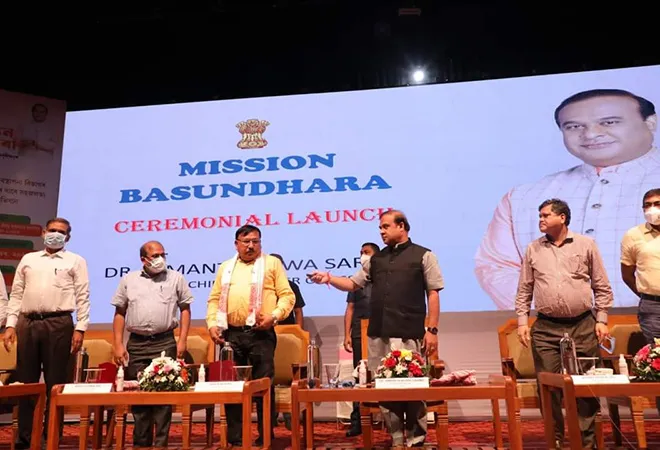-
CENTRES
Progammes & Centres
Location
To put an end to the long conflict that mars the Northeast region, Mission Basundhara in Assam is a small effort in that direction.

Northeast India, since its independence, has been on the cusp of heightened violence on account of a wide range of issues very unique to it. One of the most crucial underlying themes that has been the root cause of many of these issues in the region has been the “ownership of the land”. The history of ethnic strife dates back at least to a century, rooted in old issues of land, forest resources associated with it, perceived encroachments, and ethnic differences. The recent Assam-Mizoram clash that led to the death of six police personnels and injured many has been a result of the continuous confrontation that has been happening across state borders in Northeast since decades. These long-standing inter-state borders disputes predominantly have their origins in the hurried demarcation and carving out of states like Nagaland, Meghalaya, Arunachal Pradesh, and Mizoram from the undivided Assam. One of the other major issues that Assam in particular and Northeast in general grapples with is the systematic encroachments of lands illegally by the foreign immigrants. This has led to a large number of landless indigenous people in the state. According to a recent report, a whopping 90 percent of Assam’s native people, out of a 3.4 crore population, do not possess permanent land ownership documents or land pattas, and as many as 8 lakh families belonging to the indigenous population are completely landless. The recently launched ‘Mission Basundhara’ in Assam is an attempt to address these land-related issues that have time and again cropped up and resulted in loss of lives and livelihoods.
The recent Assam-Mizoram clash that led to the death of six police personnels and injured many has been a result of the continuous confrontation that has been happening across state borders in Northeast since decades.
The unique scheme aims at streamlining land revenue services and ensuring easy access to public for land-related work. Government has been very objective about the goals it wants to achieve with this mission. Securing land rights of indigenous people who have lost their land due to illegal encroachments and ensuring that the most disadvantaged section of society get their land-related work done without the involvement of middlemen in the process has been two of the primary objectives that the government set to achieve with this programme.
The programme, envisioned at a budget of 225 crores, will purify and update land records in a mission mode by providing nine services online namely, mutation by right of inheritance, mutation after deed registration, partition of undisputed cases, annual patta to periodic patta conversion, reclassification of land, striking names of persons who are no longer in possession under Rule 116, ALRR, 1886, allotment certificate to periodic patta, legacy data updation/rectification and mobile number update of Pattadar. The mission is also set to conduct a polygon survey across 672 non-cadastral villages of Assam and re-surveys of all 18,789 cadastral villages in Assam and total digitisation and integration of maps under the Digital India Land Records Modernisation programme leading to accurate synchronised real time land records.
Successful implementation of Mission Basundhara can play a direct significant role in promoting peace, justice, and institutional mechanism in the state (SDG16). The survey of non-cadastral villages shall not only enable the state to grant land rights to landless indigenous people of the state but also in identifying illegally encroached land in the state which predominantly has been occupied by illegal immigrants, putting an end to years of conflict and bringing peace and stability. Further digitisation of maps shall ascertain clarity in disputed interstate land borders will have a similar effect.. Last but not the least, digitisation of services will significantly bring down corruption which has been predominant in circle offices across the state. The government has already taking stern steps to eliminate middlemen from the system and arrested 500 illegal land brokers in a day as a symbolic step indicating no tolerance to corruption. Strengthening institutions through digitisation, fighting corruption and bringing about peace across states and within the states are areas where the Mission Basundhara can play a significant role.
The government has already taking stern steps to eliminate middlemen from the system and arrested 500 illegal land brokers in a day as a symbolic step indicating no tolerance to corruption.
Apart from directly impacting the SDG 16, the programme can also significantly contribute across SDG1—End Poverty—and SDG2—No Hunger— respectively by granting land rights to landless indigenous people. A recent research by Dr Malancha Chakraborty also corroborates the argument that SDG16—promoting peace, justice and strong institutions—plays an important role in achieving SDG 2 targets.
Northeastern states share around 98 percent of their borders with foreign countries. Illegal immigration and illegal encroachment of lands that belonged to the indigenous tribals has been an issue which is common across all states in Northeast. Inter-state border tensions have also prevalent across states like Arunachal Pradesh, Mizoram Meghalaya, Assam, and Nagaland. An initiative like Mission Vasundhara should, therefore, be not only restricted to Assam but should be adopted across all states of Northeast to put an end to the interstate disputes as well as to help in identification and redistribution of large land masses that have been illegally encroached.
The views expressed above belong to the author(s). ORF research and analyses now available on Telegram! Click here to access our curated content — blogs, longforms and interviews.

Rouhin Deb was an Associate Fellow at ORF Kolkata. His research focuses on informal competition strategic choices and international businesses. ...
Read More +